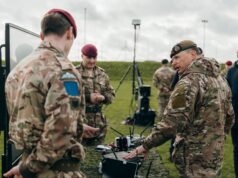In response to a recent question from Lord Reid of Cardowan on the mental health support available for active duty personnel and veterans, the Ministry of Defence has outlined ongoing initiatives and new developments aimed at improving mental health services.
Lord Coaker, Minister of State for Defence, provided a comprehensive answer highlighting both direct medical interventions and non-medical support systems that form part of the government’s commitment to mental health and wellbeing in the Armed Forces.
Lord Coaker detailed that the Ministry of Defence (MOD) works closely with multiple stakeholders, including Defence Medical Services (DMS), to advance mental health support while promoting resilience and reducing stigma associated with mental health issues. The DMS is implementing a range of reforms to enhance mental health services by “reducing waiting lists, improving timelines for patient recovery and refocusing on earlier intervention”.
This restructuring includes creating a streamlined, single point of access for mental health services, enabling quicker access to assessments and more effective allocation of treatment.
The MOD’s approach includes non-medical interventions that complement medical services. Initiatives such as the Defence Senior Leaders Mental Fitness and Resilience course, HeadFIT, and the Annual Mental Fitness Brief provide targeted mental health and stress management training. Each branch of the Armed Forces also delivers tailored career mental health and stress management training.
The UK’s National Health Service (NHS) supports the mental health needs of veterans through services like Op COURAGE, a programme tailored to veterans and active service members transitioning back into civilian life. “Since its inception in April 2017, there have been over 38,500 referrals to Op COURAGE,” Lord Coaker noted, showing the impact of the programme. Additionally, NHS Talking Therapies remains available to veterans who prefer mainstream support options, with “63,810 veterans accessing Talking Therapy treatment services between April 2020 and June 2024”.
These measures underscore the MOD’s commitment to addressing mental health issues for Armed Forces personnel and veterans, aiming to offer comprehensive, accessible, and responsive mental health services that are sensitive to the unique needs of the military community.














If this is delivered it will be great news. The Conservatives voters are anti mental health discussions and so the last goverment has cut the support a lot both for serving personal and also for the average person.
If people were more comfortable talking about mental health issues, they would be identified and resolved faster and productivity would go up, but instead we have the anti-woke nonsense.
There is also a generational divide here (though that’s true of Tory/labour voters to an extent as well). The old ‘don’t talk about it’ attitudes are less common among younger people.
So time counts for something here, but don’t mistake that for me defending the Tory mental health record for one second.
It is but it’s the equivalent of trying to push back the tide, the world has changed and whether policticans agree with it or not, they need to come to terms with it.
Youth of today are the pensioners of tomorrow and therefore the voters of tomorrow, annoying them is stupid short term thinking.